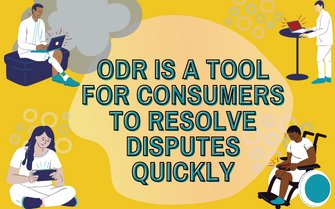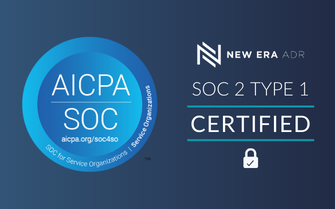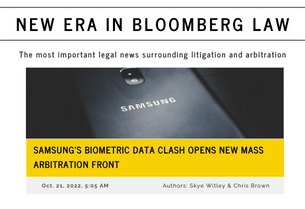
In this article we discuss how Online Dispute Resolution (ODR) is an easier and more efficient way to solve consumer disputes.
80% of the Global Population Uses Smartphones
In 2011, Pew Research Center’s first survey of smartphone ownership determined that 35% of Americans owned a smartphone. By 2021, that number shot up to 85%. With more than 6.4 billion smartphone users, this means that more than 80% of the global population uses smartphones. In the United States, a person spends an average of 2.55 hours a day on their smartphone so it’s no surprise that mobile web traffic accounts for 54.8% of global web traffic. [Source]
In short, we have achieved ubiquity with mobile devices. For the small percentage of the population who resist the use of smartphones, access to computers and other web-accessible devices makes up a vast portion of the shortfall. The ability to access the internet means physical travel to places like court, the grocery or even your employer’s office may no longer be necessary. In the legal industry, seeking justice has become easier for many through online dispute resolution (ODR) platforms, which became popular during the pandemic when commutes were paused and physical courtrooms closed. As pandemic precautions ease, many find virtual forums are still preferred.
Online Dispute Resolution (ODR) is the Future of Arbitration
Digital dispute resolution counters the long-held belief that arbitration is biased against consumers. A popular argument against arbitration is a perceived imbalance of power between the parties, with the larger, more resourced party able to impose their will on the consumer by requiring travel and use of delay tactics. The stigma surrounding arbitration has given rise to a movement to limit mandatory arbitration clauses that require consumers to arbitrate.
While it is important to examine any forum where legal decisions are made, the case against arbitration is based on an outdated model. Critics of mandatory arbitration clauses believe they dissuade consumers from filing claims. That may have been true when consumers were required to travel and abide by arcane, confusing, and obtuse rules, but online dispute resolution is capable of creating a fair, neutral, and efficient platform for resolution. And what better place to familiarize consumers with a platform than through their own devices?
Check out our Related Article: The Most Important (and Possibly Dangerous) Clause in Your Terms
Value in Ease of Use
Consumers are intimately familiar and comfortable with online platforms and wizards that guide them through a process, whether it be installing new software or doing their taxes. The increase in internet accessibility and the ubiquity of personal devices have empowered individuals to seek products, guidance, companionship, and even legal resolutions using their smartphones. A future where smartphone users are inclined to seek justice using an online platform is better than subjecting individuals to forced attendance, expensive travel and the burden of navigating complex rules and filing procedures. As a result, substantial savings can be passed along to the consumer. In addition, there is value in limiting appeals. A consumer who can easily and confidently file a claim and access the platform is less likely to challenge the outcome. The ability to have your case heard without any procedural hoops or speed bumps means you are more likely to be satisfied with the verdict.
Shrinking the Ecosystem of Expenses
Court litigation and traditional arbitration rules and procedures have grown exponentially over time, resulting in extended proceedings and higher fees. This benefits those attorneys who might look to draw out the proceedings and the institutions capitalizing on the inefficiencies; not parties looking to reach a resolution in a timely manner.
ODR platforms can limit ancillary expenses by (1) enacting more stringent deadlines and (2) streamlining rules and procedures. Progressive ODR platforms empower the neutral to control the proceeding, set deadlines, and prevent anyone who may try and delay the case. When the focus is on the facts and the advocacy; and not on the rules, procedures, and gamesmanship, the proceeding will be inherently more fair and less expensive for everyone.
Faster Relief
By reining in the rules and procedures, the duration of the proceeding is reduced substantially, which allows an aggrieved consumer to get faster relief when their case is meritorious.
For example, let’s say a consumer was injured in a slip and fall accident at a store and is accruing medical expenses to treat their injuries. If there is not expedient relief, those expenses may become prohibitively large and potentially impact the consumer’s quality of life, physically, mentally, and financially. They simply cannot afford to wait for the conclusion of a two to three year court case or traditional arbitration.
Moreover, if they suffered substantial injuries, travel and/or extended proceedings may be arduous or impossible for the consumer. The ability to participate in the proceeding from a phone or a computer will allow the proceeding to keep moving forward. And conversely, a consumer who inadvertently brings a claim without merit will quickly understand that their options for relief are limited, instead of having to wait months or even years to be told the same thing.
ODR is Beneficial For Both Sides
While there is an overarching belief that most companies insert arbitration clauses to hamstring consumers’ ability to bring claims, the truth is many progressive companies are now researching alternatives to court and traditional arbitration, including the use of ODR. Perhaps part of thawing the relationship between consumers and companies is having both parties recognize that while there may be competing interests, searching and implementing new solutions to old problems can benefit both parties. At the end of the day, protracted litigation can sometimes be a strategy, but it rarely results in positive outcomes. As companies embrace the digital age and make it easier for consumers to resolve their claims, they will find that doing so saves everyone involved valuable time, energy, and money.
Need to see Dispute Resolution Software for yourself? Book a Demo, here.
Subscribe to Our Newsletter

Collin is the Founder and Chairman of New Era ADR. Collin was previously General Counsel at Reverb.com, the preeminent digital marketplace for the buying and selling of musical instruments, gear and equipment. Reverb was one of Inc. Magazine’s fastest growing companies in 2017, 2018 and 2019. Collin ran Reverb’s acquisition by Etsy in 2019 for $275M.
Prior to Reverb, Collin was the first attorney at a healthcare technology start-up in Chicago that was also one of Inc. Magazine’s fastest growing companies in the country, as well as Corporate Counsel in the first cloud computing legal department of Oracle, a Fortune 100 company.
The inspiration for New Era came from the first 11 years of Collin’s practice which was spent as a litigator at Greenberg Traurig, LLP and Butler Snow, LLP where he litigated hundreds of cases, many of which he took fully through trial or arbitration/mediation.
Collin has also been a Director for Streetwise, one of the largest homeless aid organizations in the Midwest, an Associate Board Member of Make-A-Wish Illinois and a mentor with Real Industry.
Collin holds a B.A. from Middlebury College and a J.D. from Tulane University School of Law




